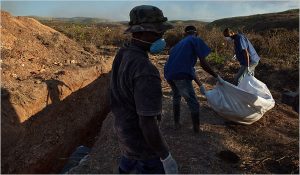After the magnitude-7.0 earthquake destroyed Haiti earlier this year, the Nov. 28 Election Day for a new president, 99 deputies, and 20

senators never seemed so promising or necessary for the ravaged country that has been struggling to rebuild. But some people are wondering whether political interest is a smart, or rather realistic, strategy during a time of anarchy, hostility, and the recent cholera outbreak in the Caribbean country which has claimed the lives of 2,000 and left 70,000 others infected. Resident Johnny Freleng expressed his anger over the relief situation and said that elections would only lead to more strife: “We are living in shit and the UN does not do anything except give us cholera. Where is the aid America and everyone promised? But our politicians are no better; they are just a bunch of thieves. This election does not matter.”
The betrayal by Haiti’s own leaders is not felt by just Freleng. In fact, Mario Joseph of the Bureau des Avocats Internationaux, called the entire political spectrum an “immoral system manipulated for fraud” in which corrupt leaders use fabricated stories and intimidation to achieve their goals. Casual laborer, Etienne Gilbert, concurs, “Of course, they will steal votes from those who have gone. Those who are living are selling their votes, but the votes of the dead are cheaper.” Despite the corrupt elections, Lut Fabert, head of the EU diplomatic mission in Haiti, explained that election deferral or cessation could give rising power and control to terrorist or criminal factions. “To not have elections now could jeopardize political stability in Haiti.”
Nevertheless, Haiti has been anything but stable. In recent weeks, anti-U.N. riots and protests in the form of open gunfire, arson, and assault by rocks, have been organized to retaliate against U.N. Nepalese peacekeepers whom natives of Haiti are blaming for bringing the cholera through discarded waste in Haiti’s waters. Although the origin of the disease is unknown, the claims by the people of Haiti are vehemently denied by the United Nations. With poor sanitary conditions and limited clean water supplies, the cholera has expanded too much of Haiti, leaving Sunday’s elections a dubious notion in the air. Regardless of a possible voting setback, the United States is offering $14 million for voting equipment and international observers responsible for supervising the elections.







